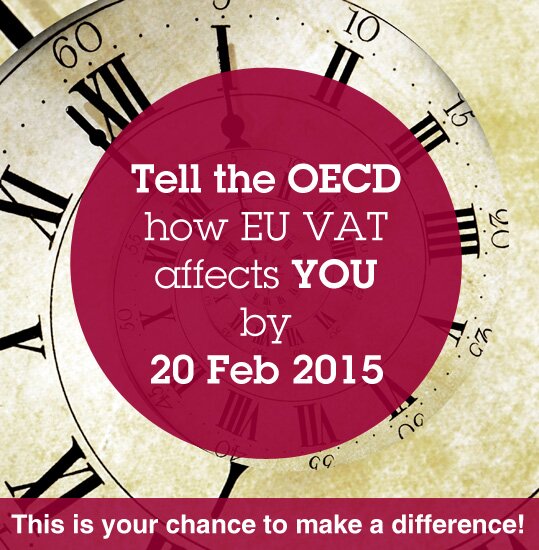It sounds like an awful lot of money, doesn’t it? €100,000 or £74,000 at current exchange rates. Surely that’s a high enough turnover threshold to mitigate the damaging impact of EU digital VAT?
Let’s look at the detail. Bear in mind that €100,000 isn’t a single person’s salary. It’s a theoretical business’s annual turnover, not profit. Profit is what’s left after operating expenses, wages, advertising, accountancy, IT and all other costs have been deducted from total income. A widely accepted rule of thumb is a new business should aim for 5% profit if it’s going to stay afloat. For a business on this proposed threshold, that means €5,000/£3700 available after all other overheads have been covered. That’s not money for throwing a party but for investing in ways to develop and expand the business.
How about moving into digital sales across Europe? For the moment, we’ll slide over the fact that online businesses are global by their very nature from the outset, because that’s how the Internet works. Let’s assume our theoretical business has been operating solely in its own EU state and now looks at the burden of VATMOSS compliance.
Bear in mind that this burden isn’t only additional accountants’ fees and computer costs. This business needs a software solution that’s fully compliant with the new regulations. A few are on offer now but a lot fail closer inspection. In addition this solution needs to be integrated with an existing platform and ecommerce systems. If something’s not compatible, there may well be further costs in new hardware and online services.
Even something as comparatively simple as cookie notification software can throw up conflicts. A VATMOSS solution will be vastly more complicated, demanding extensive shopping around, testing and bug fixing, all of which take up valuable time. The less IT expertise a business has in-house, the more time this will take. Time is something small businesses can rarely afford to spare and certainly can’t afford to waste.
Even hiring in IT specialists to handle everything isn’t a complete solution. Whoever’s running the business still needs to understand the basics of these new regulations in order to be certain that whoever is overhauling their online checkout understands exactly what’s needed. It takes time and effort for both sides to get up to speed. If they don’t? That’s how IT projects fail spectacularly and expensively.
And every hour spent on EU VAT, VATMOSS and compliance is an hour not spent on work generating income to contribute to that 5% profit. Businesses have reported compliance costing them one or two people’s full-time hours for at least a month, in some cases more.
Still, a business has to invest to grow. Speculate to accumulate. Maybe this will be worth it in returns from increased sales? Let’s hope so, since a business must commit to these up-front costs without necessarily knowing what their cross-border digital sales will be. Up until now, if you’re trading online, you haven’t needed to know where your customers are located. It’s not as if you’re sending them a parcel.
Here are some actual examples of costs in time and money incurred by businesses hit by these regulations since 1st January 2015.
Using the VAT they’ve discovered they owe for the first quarter, January to March 2015, and using 20% as an approximation of VAT rates, we can roughly estimate the value of their projected annual cross-border sales – always remembering that income from sales is by no means all profit.
• £1000 (plus 2 months of work) to build a new website to cope
£36.95 VAT owed for Q1 2015
£750 approximate annual sales subject to EU VAT.
• £500 in web development costs.
£0 VAT owed for Q1 2015
Fingers crossed for the rest of the year then…
• £1000 (£175 in accountancy fees plus time)
£10.09 VAT owed for Q1 2015
£250 approximate annual sales subject to EU VAT
• €900 – €1500 costs
€50 VAT owed for Q1 2015
€1000 approximate annual sales subject to EU VAT
• £700+ in software and accounting costs
£18.74 VAT owed for Q1 2015
£400 approximate annual sales subject to EU VAT
Consider those costs against that £3,700 available to our €100,000/£74,000 company.
Against £1,850 available after turning a 5% profit on €50,000/£37,000 annual turnover
Against £925 for a start-up bringing in €25,000/18,500 in its first year.
Every business must assess plans and investment with rigorous cost versus benefit analysis. Where’s the justification for spending money on an EU digital VAT solution when it’ll be anywhere from two to five years before the up-front cost is paid off and cross-border sales even become profitable?
Lots of other ideas will be competing for that money. Ideas offering far more realistic prospects for short term profit and longer term gains. Especially where digital sales are only one element of a trading strategy, alongside the sale of physical goods, consultancy or other services.
Even when a business is wholly digital, creating products still costs time and money. Making music, fiction, non-fiction resources, training materials, knitting patterns or anything else requires hardware and software. Those need maintaining and updating and digital enterprises still have to finance advertising, customer service, professional skills training, and so on.
No wonder online businesses in every EU state are now opting for geoblocking or using 3rd party marketplaces, even at the cost of a middleman’s fees. At least that only means losing money on actual sales. Others are doing away with automated digital products entirely, even if offering low cost, entry level downloads has been an integral part of their marketing strategy and business plan.
This includes businesses trading well over that proposed €100,000 threshold. We have heard from one enterprise with an annual turnover around £300,000 and nine staff. They have taken measures to keep their business outside the scope of this legislation after calculating their total annual VAT payable on the digital products they used to sell would be around about £1,500 per year. Compliance could cost up to £15,000. A €100,000 threshold won’t change their cost-benefit analysis.
These are the sort of calculations which underpin existing EU exemptions for small and medium enterprises, relieving them of the burden of compliance with other financial and audit requirements. These are the reasons why a business with an annual turnover of €2 million and ten employees can still be considered ‘micro’ and warrant such consideration, astonishing though that may seem.
But there’s no threshold or any exemption from these new digital tax regulations. A business is liable for collecting and handing over the correct tax owed, according to 28 different countries’ VAT rates from their very first €1 sale.
No wonder MOSS registrations across the EU by the end of this first quarter are so ludicrously low. And with registrations so low, how much income will the new system actually generate, to justify this wholescale upheaval? What revenue will governments see to offset the incalculable damage this is doing to the digital single market across Europe?

